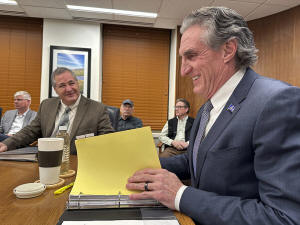North Dakota regulators OK underground storage for proposed Midwest
carbon dioxide pipeline
 Send a link to a friend
Send a link to a friend
 [December 13, 2024]
By JACK DURA and STEVE KARNOWSKI [December 13, 2024]
By JACK DURA and STEVE KARNOWSKI
BISMARCK, N.D. (AP) — North Dakota regulators approved permits Thursday
for underground storage of carbon dioxide delivered through a massive
pipeline proposed for the Midwest, marking another victory for a project
that has drawn fierce opposition from landowners.
The governor-led Industrial Commission voted unanimously to approve
permits for Summit Carbon Solutions’ three proposed storage sites in
central North Dakota. Summit says construction of the project would
begin in 2026 with operations beginning in 2027, but it’s expected that
resistant landowners will file lawsuits seeking to block the storage
plans.
“With these permits, we’re one step closer to providing vital
infrastructure that benefits farmers, ethanol producers, and communities
across the Midwest," Summit Executive VP Wade Boeshans said in a
statement.
Summit’s proposed 2,500-mile (4,023-kilometer), $8 billion pipeline
would transport planet-warming CO2 emissions from 57 ethanol plants in
North Dakota, South Dakota, Iowa, Minnesota and Nebraska for underground
storage. Carbon dioxide would move through the pipeline in a pressurized
form to be injected deep underground into a rock formation.
The company has permits for its route in North Dakota and Iowa but can’t
yet begin construction. Also on Thursday, Minnesota regulators approved
a permit for a 28-mile (45-kilometer) leg of the project in western
Minnesota.
Summit also recently applied in South Dakota, where regulators denied
the company’s previous application last year.

Last month, the company gained approval for its North Dakota route, and
Iowa regulators also have given conditional approval.
Summit faces several lawsuits related to the project, including a North
Dakota Supreme Court appeal over a property rights law related to the
underground storage plan. Further court challenges are likely.
North Dakota Republican Gov. Doug Burgum, who chairs the Industrial
Commission, is President-elect Donald Trump's choice for Interior
Secretary and to lead a new National Energy Council. Burgum has
frequently touted North Dakota's underground carbon dioxide storage as a
“geologic jackpot.” In 2021, he set a goal for the No. 3 oil-producing
state to be carbon-neutral by 2030. His term ends Saturday.
Summit's storage facilities would hold an estimated maximum of 352
million metric tons of CO2 over 20 years. The pipeline would carry up to
18 million metric tons of CO2 per year to be injected about 1 mile (1.6
kilometers) underground, according to an application fact sheet.
Jessie Stolark, who leads a group that supports the project and includes
Summit, said the oil industry has long used similar technology.
“We know that this can be done safely in a manner that is protective of
human health and underground sources of drinking water,” said Stolark,
executive director of the Carbon Capture Coalition.
[to top of second column]
|

North Dakota Republican Gov. Doug Burgum, right, and Republican
state Agriculture Commissioner Doug Goehring, left, prepare before a
meeting of the state Industrial Commission on Thursday, Dec. 12,
2024, at the state Capitol in Bismarck, N.D. (AP Photo/Jack Dura)

Summit's project has drawn the ire of landowners around the region.
They oppose the potential taking of their property for the pipeline
and fear a pipeline rupture releasing a cloud of heavy, hazardous
gas over the land.
A North Dakota landowners group is challenging a property rights law
related to the underground storage, and attorney Derrick Braaten
said they likely would challenge the granting of permits.
“The landowners that I'm working with aren't necessarily opposed to
carbon sequestration itself,” Braaten said. “They're opposed to the
idea that a private company can come in and use their property
without having to negotiate with them or pay them just compensation
for taking their private property and using it.”
Carbon capture projects such as Summit's are eligible for lucrative
federal tax credits intended to encourage cleaner-burning ethanol
and potentially result in corn-based ethanol being refined into jet
fuel.
Some opponents argue the amount of greenhouse gases sequestered
through the process would make little difference and could lead
farmers to grow more corn despite environmental concerns about the
crop.
In Minnesota, regulators granted a route permit that would connect
an ethanol plant in Fergus Falls to Summit’s broader network. They
attached several conditions, including requirements that Summit
first begin construction in North Dakota.
An administrative law judge who conducted hearings concluded in
November that the environmental impacts from the Minnesota segment
would be minimal and noted that Summit has secured agreements from
landowners along most of the recommended route.
Environmental groups that oppose the project disputed the judge’s
finding that the project would have a net benefit for the
environment.
Iowa regulators required Summit to obtain approvals for routes in
the Dakotas and underground storage in North Dakota before it can
begin construction in Iowa. The Iowa Utilities Commission's approval
sparked lawsuits related to the project.
In Nebraska, where there is no state regulatory process for CO2
pipelines, Summit is working with individual counties to advance its
project. At least one county has denied a permit.
___
Karnowski reported from Minneapolis.
All contents © copyright 2024 Associated Press. All rights reserved
 |